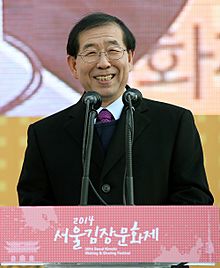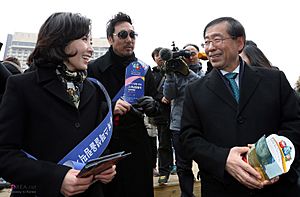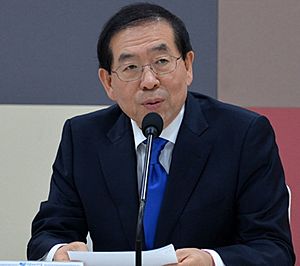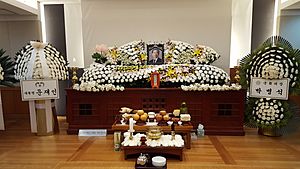Park Won-soon facts for kids
Quick facts for kids
Park Won-soon
|
|
|---|---|
|
박원순
|
|
 |
|
| Mayor of Seoul | |
| In office October 27, 2011 – July 9, 2020 |
|
| Preceded by | Oh Se-hoon |
| Succeeded by | Oh Se-hoon |
| Personal details | |
| Born | February 11, 1956 Changnyeong, South Korea |
| Died | July 9, 2020 (aged 64) Jongno, Seoul, South Korea |
| Political party | Democratic |
| Spouse | Kang Nan-hee |
| Alma mater | Seoul National University (Expelled) Dankook University (BA) London School of Economics (Diploma) |
| Signature |  |
| Korean name | |
| Hangul | |
| Hanja | |
| Revised Romanization | Bak Wonsun |
| McCune–Reischauer | Pak Wŏnsun |
Park Won-soon (Korean: 박원순; March 26, 1956 – July 9, 2020) was a South Korean politician, activist, and lawyer. He served as the mayor of Seoul, the capital city of South Korea, from 2011 until 2020. He was the longest-serving mayor in Seoul's history.
As a member of the Democratic Party of Korea, he was first elected in 2011. He won re-election twice, in 2014 and 2018. Before becoming mayor, Park was well-known for his work as a community and social justice activist. He also helped lead several important organizations that worked to improve society.
Contents
Early Life and Education
Park Won-soon was born on March 26, 1956, in Changnyeong County, a place in South Korea. He attended Kyunggi High School from 1971 to 1974.
After high school, Park started studying at Seoul National University. However, he was removed from the university and held for four months. This happened because he protested against the military government led by President Park Chung-hee. Later, he earned his Bachelor of Arts degree from Dankook University. In 1991, Park studied international law at the London School of Economics, which is part of the University of London.
A Career Helping Others
Park began his career as a public prosecutor in the Daegu District Court from 1982 to 1983. A public prosecutor is a lawyer who works for the government. They bring legal cases against people accused of crimes.
After working in Daegu, he moved back to Seoul. There, he started his own law practice. He became a human rights lawyer, helping to defend many political activists during the 1980s and 1990s. These activists were often speaking out against the government.
Fighting for Human Rights
In 1993, Park was a visiting research fellow at Harvard University's School of Law. He studied human rights there. The next year, in 1994, he helped create an important group called People's Solidarity for Participatory Democracy (PSPD). This group is a "watchdog" organization. It watches how the government works and tries to stop political corruption.
Starting Important Organizations
In 2002, Park left PSPD to lead The Beautiful Foundation. This group encourages people to volunteer and help their communities. It also works to solve problems like income inequality, which is when some people have much more money than others.
From 2005, Park was part of South Korea's Truth and Reconciliation Commission. This commission looked into human rights problems in Korean history. It covered the period from 1910, when Japan ruled Korea, until 1993. In 2006, Park started the Hope Institute. This was an offshoot of The Beautiful Foundation. The Hope Institute is a "think tank" that looks for solutions to social, educational, environmental, and political issues. These solutions often come from ideas suggested by everyday people.
As a lawyer, Park Won-soon won several important legal cases.
Becoming Mayor of Seoul
First Election as Mayor
In the Seoul mayoral by-election on October 26, 2011, Park Won-soon was elected mayor. He ran as an independent candidate. This means he did not belong to a major political party at the time. However, he had the support of the Democratic Party and the Democratic Labor Party.
His victory was a big moment in South Korean politics. It showed that an independent candidate could win a major election with broad support.
Key Actions as Mayor
As mayor, Park suggested friendly football matches and orchestra events between South Korea and North Korea. He also praised Japan's local government system during his disaster prevention training there.
In early 2012, Park was accused of illegally changing his son's army health checkup results. This was said to help his son get a better army post. However, after his son had a public health checkup, Park and his son were found innocent. Those who made the accusations apologized to them. Park later said he would forgive his accusers. In February 2012, Park joined the Democratic United Party.
On September 20, 2012, under Park's leadership, the Seoul Metropolitan Government started the Sharing City Seoul Project. This plan aimed to promote a "sharing vision" in the city. Because this plan was successful, Park became known in South Korea and around the world as a leader of the "Sharing City" idea.
On April 14, 2013, Line 9 of the Seoul Metropolitan Subway announced a sudden fare increase. Park did not agree with this. He warned that if the subway company raised fares without talking about it, Seoul would take over managing the company. Line 9 then apologized to the people of Seoul. On June 4, 2014, Park was elected for his second term as mayor.
Park was a strong critic of then-President Park Geun-hye. He took part in large rallies against her in central Seoul. These protests led to her impeachment and removal from office in 2017 due to corruption charges. On June 13, 2018, Park was elected to his third and final term as Mayor of Seoul. He was the first mayor in the city's history to be elected three times.
Personal Life
Park Won-soon was married to Kang Nan-hee. They had two children together: a daughter named Park Da-in and a son named Park Ju-sin.
In 2006, he received the Ramon Magsaysay Award. This award is given to people in Asia who show greatness in public service.
Later Life
On July 9, 2020, Park's daughter reported him as missing. She told the National Police Agency that he had reportedly taken sick leave. His cell phone was turned off in the Seongbuk District of Seoul. His body was later found near Sukjeongmun on Bugak Mountain in northern Seoul.
Park's family held a public funeral at Seoul City Hall on July 13, 2020. It was also streamed online. About 992,000 people paid their respects to Park on an online mourning website set up by the city.
See also
 In Spanish: Park Won-soon para niños
In Spanish: Park Won-soon para niños
 | Calvin Brent |
 | Walter T. Bailey |
 | Martha Cassell Thompson |
 | Alberta Jeannette Cassell |




